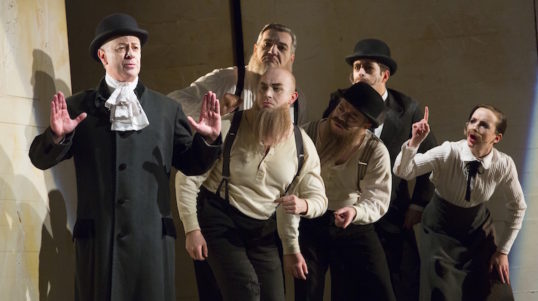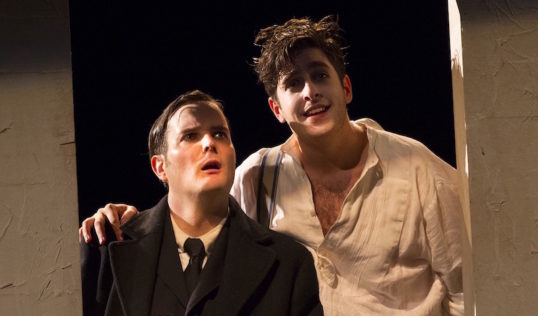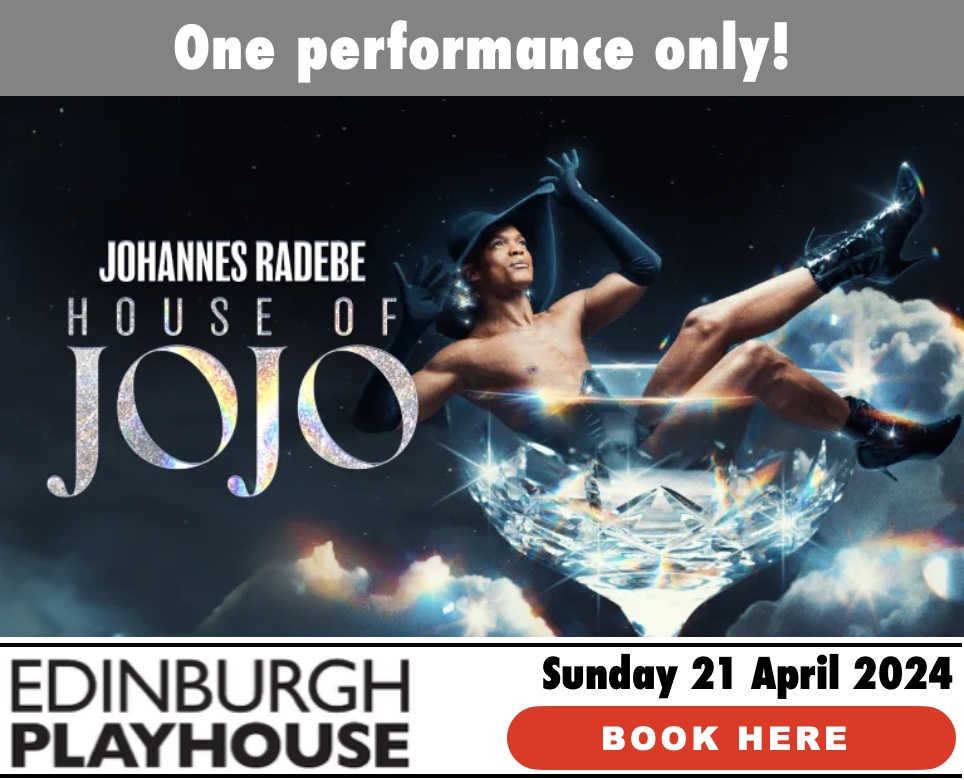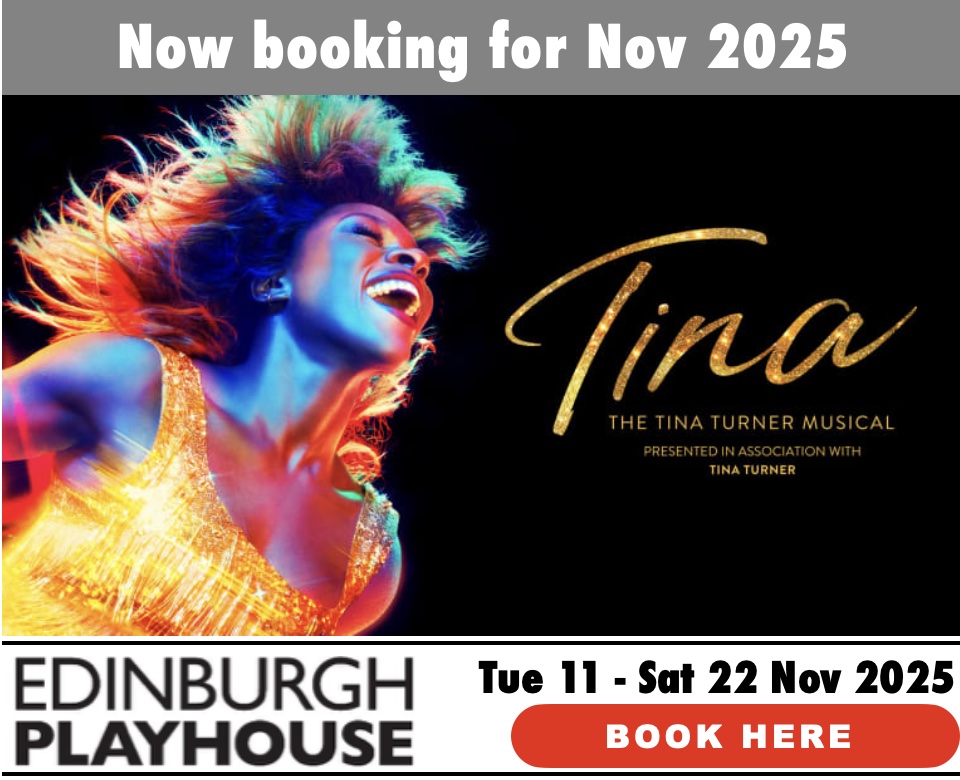The Trial
★★★★☆ Brutal
King’s Theatre: Fri 3/Sat 4 Feb 2017
Review by Thom Dibdin
Dark, brooding and brutal, Scottish Opera’s take on Kafka’s The Trial, catches several areas of resonance and delivers a piece which is as glorious as it it is forbidding.
With music by Philip Glass and lyrics by Christopher Hampton, it is surely not chance that made Scottish Opera programme the work in the middle of Glass’s 80th birthday celebrations. It is a fitting tribute to the composer and definitely one for fans of total immersion in his works.
But it is equally certain that no one, not anyone, when programming Kafka’s The Trial, could have predicted the chilling events in the United States over the last few days and weeks as the Trump Administration started flexing its muscles.
When the person who is the de-facto “leader of the free world” can summarily sack their highest ranking lawyer for disagreeing with them on a (repressive) point of law at the beginning of a week – and then end it by slashing consumer protection so that his billionaire “friends” can borrow money more easily – in that week, you need a good bit of Kafka to remind you of what it is you are facing.
And this is definitely a good bit of Kafka. Hampton, who is best known as the writer of Les Liaisons Dangerouse, picks out the dark humour here, the twisted logic of a repressive regime where you are accused but never told what for.
The comedy and humour that underpins the bleakness of both the original story and the opera, is magnified under Michael McCarthy’s magnificent direction. The stage becomes stuffed with leering, prurient, black-clad figures. Disembodied hands appear through walls to deliver necessary bits of props, and it seems that the only human contact Joseph K can have is with those who have already sold themselves to the court.
gangly demeanour
Nicholas Lester makes a hugely impressive Joseph K. His voice copes well with the repetitiveness of Glass’s music, while his gangly demeanour sets him physically apart from all the rest. He has an honesty about him, as if he were one of John Clease’s bank-manager characters, lost in a maze of officialdom which they had hitherto thought necessary.

Gwion Thomas, Michael Druiett, Elgan Llyr Thomas, Hazel McBain, Paul Carey Jones and Daniel Norman. . Photo James Glossop
Around him, the cast of little men, court functionaries and sexually rapacious women bring about their own elements of control, and expressions of being controlled. There is, perhaps, little for most of them to deliver in terms of characterisation – this is an opera of caricatured and macabre movement. But the vocal delivery is very strong indeed, for the most part.
Two of the acting performances really stand out, though. Hazel McBain as Leni, the servant of Joseph K’s lawyer, Huld (Gwion Thomas), who finds anyone accused by the court to be sexually irresistible, has a real hunger about her and a beady-eyed sense of control.
And then Elgan Llyr Thomas plays the painter, Titorelli, with a suggestive smirk. His knowledge of how things work is obviously considerably greater than the power and influence he appears to control, as portrait painter of all the top judges, and he highlights this with the cheeky grin of a poaching centre forward who has just nicked the ball in the six-yard box and rolled it into the net.
There are telling performances, too, from Michael Druiett as Joesph’s self-obsessed uncle, Daniel Norman, as the obsequious Block and Emma Kerr as the court Washerwoman, who complete the eight-strong cast, who all (Joseph apart) double at various points.
self-censorship
The meat, here, is that the real control is self-control; that by accusing someone of an unspecified crime, their self-censorship will keep them in place. And if not, then they will be in for an untimely, brutal demise.
As for that Glass score, given a warm resonant telling here by Derek Clark, conducting a band made up of soloists from the Orchestra fo Scottish Opera, it thrums and hums over solidly constructed bass lines, with shifting vocal lines that always brings a clarity to the meaning – double meaning sometimes.
No more so than in he opera’s climactic scene, where Joseph K confronts Paul Carey Jones, as the man who calls himself the Prison Chaplain. And suddenly, with the prurient bystanders gone and Simon Banham’s sharp minimal design cleverly lit with a sense of impending dread by Ace McCarron, the focus of control becomes very clear indeed and given a human scale.
Running time: 2 hours and 10 minutes (with one interval)
The King’s, 2 Leven Street EH3 9LQ. Phone booking: 0131 529 6000
Fri 3/Sat 4 February 2017
Evenings: 7.15pm.
Tickets and details: http://www.edtheatres.com/thetrial
ENDS


















